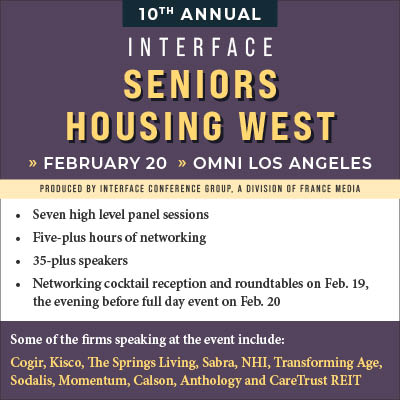Nobody thinks it will happen to them . . . until it does.
By Susan Saldibar
Accessibility is one of those things that isn’t an issue until a family member notices something and files a complaint. Or until a regulatory agency decides to measure the slope of the parking lot to catch someone with a slope that is one degree too high. Or, worse yet, until someone falls and is injured.
Are you assuming you are in compliance? You probably aren’t.
Greg Proctor, VP of RealPage Compliance Services (a Senior Housing Forum partner) tells me that many operators are not even aware they are out of compliance. “They trust their contractors to make sure they are up to code, but all too often the contractors themselves may not be on top of compliance standards,” he tells me.
Greg has conducted hundreds of compliance inspections for RealPage. And he will be conducting a webcast coming up on September 20th that covers all the latest compliance issues in conjunction with stringent ADA and FHA requirements. So I asked Greg what operators really need to know about today’s regulatory landscape and what they should be doing to make sure they are meeting the requirements. There are two main points Greg thinks are important to make:
-
The risk is very real. Greg tells me he has never seen a single community out there that is 100% compliant, 100% of the time. “Things fall out of compliance all the time due to changes as simple as re-striping a parking lot or changing a doorknob,” he says. “This is something that you need to keep on top of. It’s not a ‘one and done’ process,” he adds.
-
Have your community inspected. “Don’t wait until a resident, family member or attorney files a lawsuit or complaint against you,” Greg warns operators. “Take control of your own compliance. Bring in professionals who live and breathe this every day. They know what to look for and the most expeditious way to bring a community back into compliance,” he adds.
Which would you rather pay for? A proactive inspection or a lawsuit?
It’s also important to note that many lawsuits occur over variances that are undetectable to the naked eye. So these aren’t always glaring issues that are easily identified and rectified.
As Greg tells me, the worst thing operators can do is cross their fingers and hope no one files a complaint. Not taking action can cost up to several million dollars, especially if an attorney or individual gets an action against you going. “When that happens, you will be paying penalties, not to mention attorney fees, court fees, inspection fees and so on,” he says. And, yes, it does and can happen to you.
And, apparently, it’s happening now more than ever, Greg tells me. That’s why he recommends that operators take steps to make sure their properties are in compliance and remain in compliance to safeguard their communities from unnecessary legal action.
Yet, despite all this, Greg tells me, many operators still don’t understand the risk. “I can drive by just about any community and instantly identify 1-2 items of non-compliance,” says Greg. “And if I can do it, so can attorneys!”
Nobody thinks it will happen to them. Until it does.
As a veteran inspector, Greg has a lot of war stories to share. And some are pretty amazing. He told me about a company whose sidewalks had a slope greater than 5%. That meant, according to the accessibility regulations, they are no longer considered sidewalks, they were now considered “ramps.” And you can’t have a ramp without railings. Adding railings initially would have cost a few thousand dollars. But after the whistle got blown on them, they ended up paying about ten times that amount to quickly bring their company back into compliance and settle the claims. Had they only taken the time up front to have a professional conduct an inspection, they would have caught and corrected it. They could have avoided the hassles, the extra cost and the hit to their brand.
And Greg has plenty more stories to tell for those willing to listen. “The bottom line is that nobody ever thinks it will happen to them,” says Greg. “Until it does.”
To find out everything you need to know about compliance, you can visit the RealPage Compliance Services website.
Don’t miss RealPage’s live webcast on September 20th that will cover a wide range of ADA compliance topics. You can register for the webcast here.
**Please note that this blog article is being provided for informational purposes only. It does not constitute legal advice and should not be used or relied upon as a substitute for such advice. You should consult with a qualified professional for any legal questions you have relating to the subject matter.**
Learn more about all of RealPage Senior Living Solutions by visiting www.realpage.com/senior:
Click the button below to download a PDF copy of this article:







